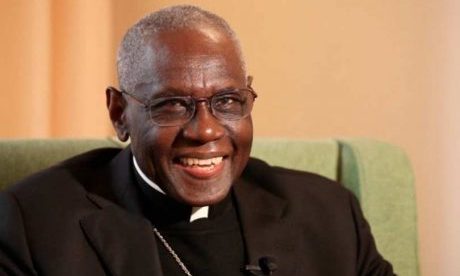A growing crowd wants Cardinal Robert Sarah’s head on a platter.
Open a liberal Catholic periodical and you are likely to find a call for the dismissal of the Guinean cardinal who heads the Vatican’s Congregation for Divine Worship: “It’s past time for [Pope Francis] to replace Cardinal Sarah” (Maureen Fiedler, National Catholic Reporter);
“New wine might be needed at the Congregation for Divine Worship” (Christopher Lamb, the Tablet); “Curia officials who refuse to get with Francis’s programme should leave. Or the Pope should send them somewhere else” (Robert Mickens, Commonweal);
“Francis must put his foot down. Cardinals like Robert Sarah … may feel that with a papacy heading in the wrong direction, foot-dragging is a duty. But that does not mean Francis has to put up with them” (The Editors, the Tablet).
Sarah was not always treated as the most dangerous man in Christendom. When he was appointed to his post by Pope Francis in 2014, he enjoyed the goodwill even of those who criticise him today.
Mickens described him as “unambitious, a good listener and, despite showing a clear conservative side since coming to Rome … a ‘Vatican II man’ ”.
Lamb was told by his sources that Sarah was someone liberals could like, the kind of bishop who was sympathetic to “inculturation”.
John Allen summed up the consensus around the Vatican: Sarah was a low-profile bishop, “warm, funny and modest”.
All that changed on October 6, 2015, the third day of the contentious synod on the family.
The synod fathers were riven by the seemingly competing demands of reaching out to people who felt stigmatised by the Church’s sexual teaching and boldly proclaiming truth to a hostile world.
In what has come to be known as the “apocalyptic beasts” speech, Sarah insisted that both were possible. “We are not contending against creatures of flesh and blood,” he told his brother bishops.
“We need to be inclusive and welcoming to all that is human.” But the Church must still proclaim the truth in the face of two great challenges.
“On the one hand, the idolatry of Western freedom; on the other, Islamic fundamentalism: atheistic secularism versus religious fanaticism.” Continue reading
Sources
- Catholic Herald article by Matthew Schmitz, literary editor of First Things and a Robert Novak Journalism Fellow.
- Image: LifeSite
